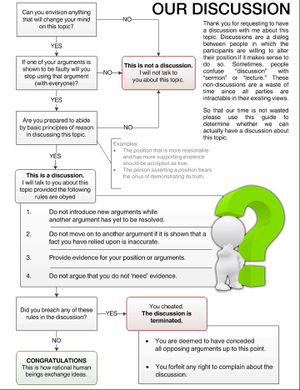Issuepedia:Arguing
About
Unlike other reference projects, Issuepedia welcomes personal opinion.
However, opinions without good arguments behind them will probably be shredded or at least questioned. Attempts to undermine other debaters by use of logical fallacies and other rhetorical deceptions will be called out.
I have cross-posted these guidelines to LessWrong wiki in hope of sparking further refinement. --Woozle 15:58, 10 September 2010 (UTC)
Guidelines
things to do
When arguing against another person's statements:
- DO address the substance of the argument you are disputing.
- DO be clear about what you're trying to say.
- DO take a position (rather than just attacking the positions of others).
- DO offer arguments:
- for why the other debater's statements are unlikely to be true.
- to support what you think is correct.
- DO respond to every point you wish to oppose.
- Failure to respond to a point does not make it untrue.
- If a point remains unanswered, it is reasonable to consider it true.
- DO draw attention to any unanswered points.
- Others may assume or erroneously believe that unanswered points have actually been defeated.
things to avoid
It generally does not strengthen your position if you:
- ...attack the other person's credibility (expertise, credentials, personal habits, age, affiliations, etc.).
- ...attack things the other person didn't actually say.
- ...attempt to emotionally manipulate the other person or the audience.
- ...attempt to associate the other person's views with shameful actions they do not support.
- ...use vague statements in place of a clear argument.
- ...simply contradict the other person without any further substantiation.
- ...cite a work of myth or scripture as an authority on factual matters.
- ...misrepresent other people's arguments.
- ...attack positions taken by others without taking a clear position yourself.
- No position is perfectly correct; the challenge is to find the position that is the least wrong
- ...tell the other person to "go look it up yourself" when asked for evidence. If you do not provide a specific source, this is an indication that you do not actually have the evidence you claim to have.
This is relevant, but I can't get the thumbnail to render properly. Statements higher on this hierarchy generally trump lower ones.
source accuracy
When disputing the accuracy of a source, or of an argument based upon a fact stated in a source:
- DON'T simply claim that the source is unreliable.
- DON'T simply claim that the fact is wrong.
- DO identify better sources.
- DO offer correct information.
source dependency
When outside material contains extensive information relevant to your argument:
- Spell out the point it makes – rather than expecting others to read it. (No required reading.)
- Otherwise you are counting on your opponent to not only understand it but agree with you as to its applicability to the discussion.
- If you can't defend your own point in your own words, then perhaps you don't understand what you're arguing -- or perhaps you don't understand what you're arguing against, and are hoping that something somewhere in the required reading will suffice as a rebuttal. (Sources are not arguments. Claiming that a source makes your point is not the same as making your point. No throwing stuff at the wall and hoping something sticks.)
- Pasting quotes is acceptable, but summaries are better -- especially if written to be specific about the matter under discussion.
- If the source's argument is complicated, state the conclusion it draws and summarize the general nature of the arguments used. You need to give others at least enough of a basis upon which to frame further counters (or, hopefully, questions).
